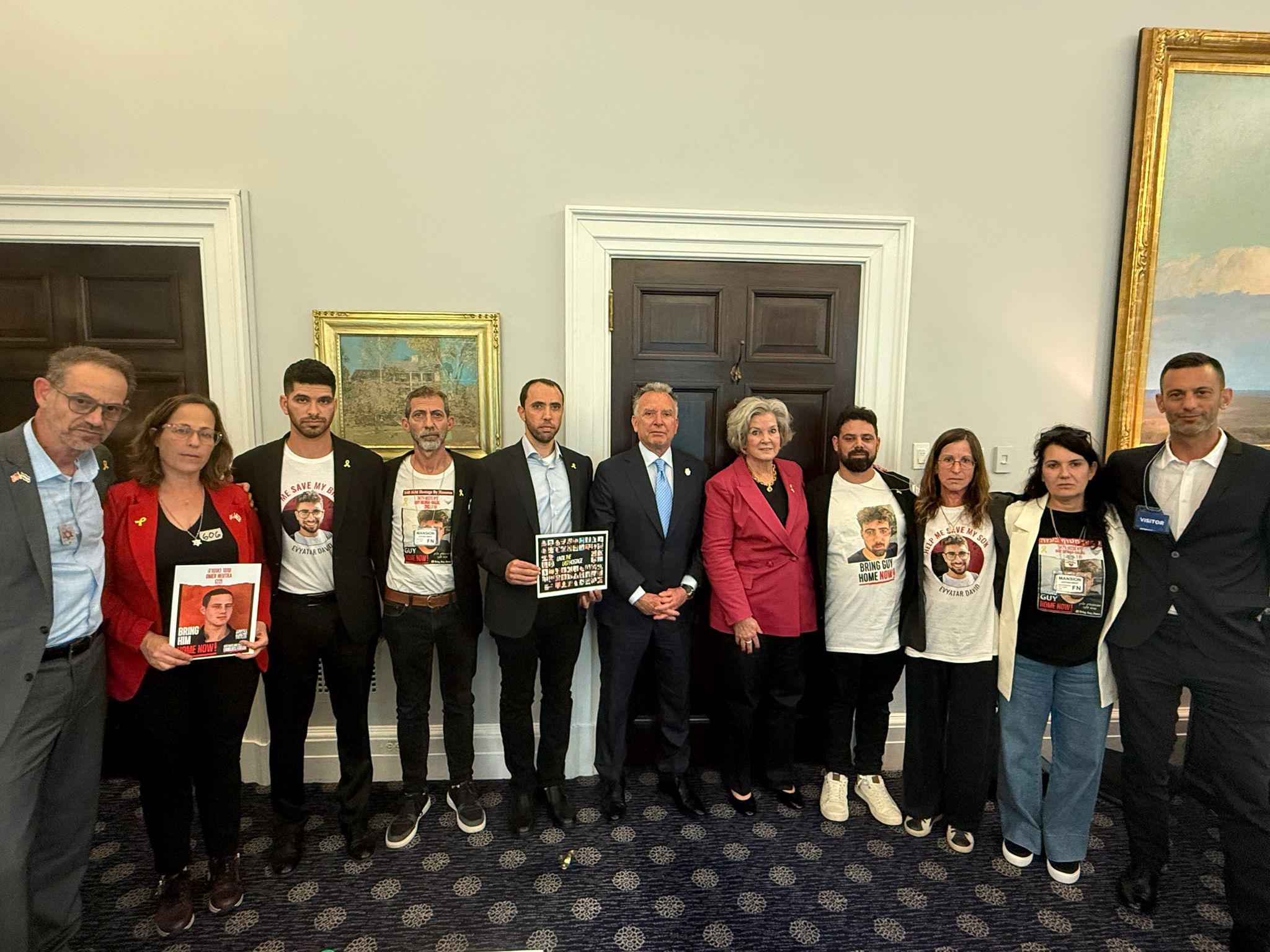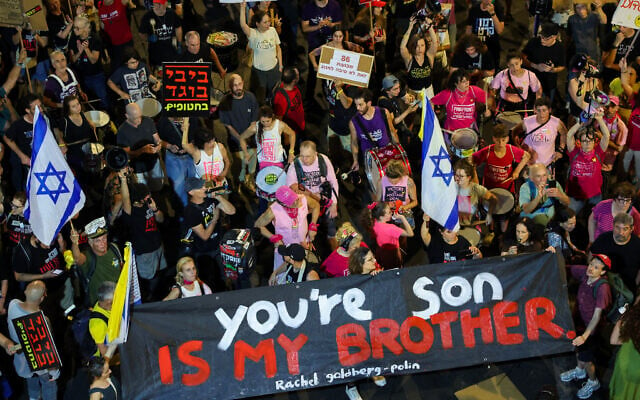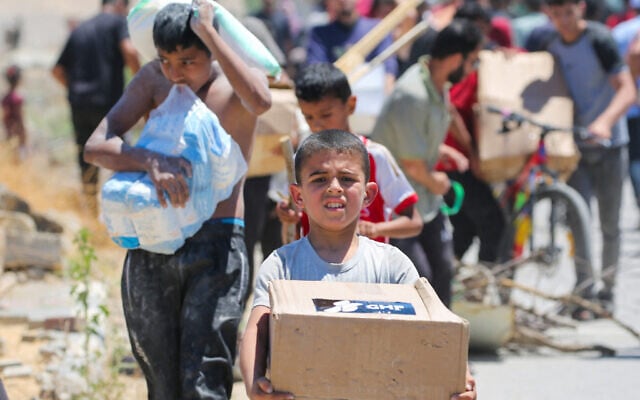



Mediators are optimistic that Hamas will soon submit an updated hostage deal proposal that will be closer to what US special envoy Steve Witkoff presented last week, three sources familiar with the matter told The Times of Israel on Wednesday.
Hamas submitted an earlier response to Witkoff’s proposal on Saturday, which the US envoy blasted as unacceptable.
Since then, Egyptian and Qatari mediators — along with Witkoff’s representative in Doha, Palestinian-American businessman and political activist Bishara Bahbah — have been working with Hamas officials to soften or remove some of the changes it made to the US proposal, an Arab official and a second source familiar with the matter said.
A third source said Witkoff is optimistic about the chances for a breakthrough before the Muslim Eid al-Adha holiday, which is slated to begin on Friday. That optimism was expressed during a meeting he held with a group of families in the White House on Tuesday.
Joining Witkoff from the Trump administration in that meeting were Commerce Secretary Howard Lutnick, White House Press Secretary Karoline Leavitt and White House chief of staff Susie Wiles.
The Israeli delegation included former hostage Tal Shoham, relatives of hostage Guy Gilboa Dalal, the parents of hostage Evyatar David and the parents of slain hostage Omer Neutra.
“Wiles, Leavitt and Witkoff expressed deep solidarity with the families and reaffirmed the Trump administration’s full commitment to securing the release of all 58 hostages. They emphasized that the administration will continue working relentlessly until every hostage is brought home,” a statement from the Hostage Family Forum said.
“We are fully committed to securing the release of all the hostages and believe their return is essential, not only on humanitarian and moral grounds but also as a critical step toward regional stability,” said a statement from Leavitt. “The [March] meeting between the president and the captivity survivors had a profound impact on him and reinforced his determination to bring every hostage home.”
Even if Hamas submits a softened proposal as mediators anticipate, the sides will still need to hold a round of proximity talks aimed at ironing out final details, including the exact parameters of Israel’s partial withdrawal from Gaza during the 60-day temporary truce currently under discussion.
The main issue of contention in the talks remains whether the temporary truce under discussion leaves enough of a window for Israel to resume fighting after it expires or if the proposal’s assurances from the Trump administration are enough to convince Hamas that the ceasefire will hold permanently.
Hamas’s Saturday response to Witkoff made a series of amendments to the US envoy’s proposal, including one that that would make it more difficult for Israel to resume fighting if talks on a permanent ceasefire are not completed by the end of 60-day truce outlined by the US, the Arab official and the second source said.
The proposal submitted by Hamas also envisions the release of the 10 hostages being spread out more throughout the two-month truce, rather than in two batches on the first and seventh day, as Witkoff stipulates.
This change was aimed at preventing Prime Minister Benjamin Netanyahu from abandoning talks on a permanent ceasefire after the 10 hostages are released or refusing to engage in the talks altogether, as he did during the previous ceasefire, which ended in March when Israel resumed intensive fighting in Gaza.
Another Hamas amendment would allow for the resumption of aid distribution in Gaza through UN-backed mechanisms that Israel has largely blocked since March, arguing that Hamas was using them to divert much of the assistance — charges the UN and international organizations deny.
Israel and the US have promoted a different model run by the Gaza Humanitarian Foundation, arguing that it can effectively box Hamas out of the aid distribution process. But the new initiative has faced mounting criticism, as it has only consisted of three distribution sites, with only one operating at a time on most days since the May 26 rollout. This has forced Gazans to walk long distances, sometimes while dodging IDF fire, in order to pick up heavy boxes of dry food products that require cooking equipment in order to prepare.
Netanyahu’s office said Sunday that Israel had accepted the Witkoff proposal. However, his cabinet has yet to hold a vote on it and several far-right ministers have expressed their opposition.
The second source familiar with the matter said Hamas was frustrated with Witkoff for closely coordinating with Strategic Affairs Minister Ron Dermer on his truce proposal before it was sent to Hamas last week. Hamas felt that the changes inserted by Dermer went against previous agreements that had been reached.
According to a copy of Witkoff’s latest proposal, the authenticity of which was confirmed to The Times of Israel by two sources familiar with the negotiations, Hamas would release 10 living Israeli hostages held in Gaza and return the bodies of 18 deceased hostages during the 60-day ceasefire.
In return, Israel would release 125 Palestinian terror convicts serving life sentences, 1,111 Gazans detained since the start of the war on October 7, 2023, and 180 bodies of Palestinians currently held by Israel.
The IDF would also pull back from some areas where troops are currently deployed; the parameters of the pullback would be finalized “during proximity negotiations.”
There are currently 58 hostages held in Gaza, including the bodies of at least 35 confirmed dead by the IDF, and 20 hostages who are believed to be alive. There are grave concerns for the well-being of three others, Israeli officials have said.


